|
|
|
Sort Order |
|
|
|
Items / Page
|
|
|
|
|
|
|
| Srl | Item |
| 1 |
ID:
086323


|
|
|
|
|
| Publication |
2009.
|
| Summary/Abstract |
After more than a decade of preparation, China finally passed the Anti-Monopoly Law (AML) on 30 August 2007. This paper examines the debate over whether or not administrative monopoly should be included in the ambit of the AML, which took place throughout the drafting process of this new law. Administrative monopoly refers to the abusive use of administrative power by government agencies to engage in monopolistic activities. Owing to the administrative nature of this type of monopoly, the intent to regulate it by an economic law, such as the AML, has stirred up much controversy. Having analyzed the arguments both in support of and in opposition to the inclusion, this paper suggests the need to adopt a more comprehensive scheme in tackling administrative monopoly. Also, the enforcement mechanism of the AML will have to be strengthened in order to prevent this new law from degenerating into 'a toothless tiger'. Furthermore, the competition law regime of China will benefit from in-depth research in overseas anti-monopoly practices. In particular, the experiences of the former socialist states in Europe should be taken into account, given that they are similarly undergoing the transition from a planned economy to a market economy.
|
|
|
|
|
|
|
|
|
|
|
|
|
|
|
|
| 2 |
ID:
086325
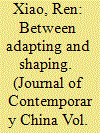

|
|
|
|
|
| Publication |
2009.
|
| Summary/Abstract |
This paper attempts to examine the process of China's participation in regional cooperation in Asia and the factors that affect its participation. It focuses on a changing China-ASEAN relationship that is reshaping Asia. To build a peaceful and stable external environment, China has been making various efforts, political, economic and in the security field, to maintain and upgrade a harmonious and constructive relationship with its neighboring East Asian countries. Politically, China acceded to the Treaty of Amity and Cooperation in Southeast Asia (TAC), essentially accepting the code of conduct stipulated by ASEAN and prompting other regional countries to observe this code. China has been supportive of ASEAN, playing a leadership role in East Asian regional cooperation. China and Asian regional cooperation is an evolving concept and a couple of theoretical points may be taken into account, such as how regional cooperation influences major powers' international behavior and vice versa.
|
|
|
|
|
|
|
|
|
|
|
|
|
|
|
|
| 3 |
ID:
086326
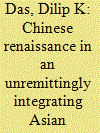

|
|
|
|
|
| Publication |
2009.
|
| Summary/Abstract |
This paper attempts to address an imperative topic in Asian economic development: the relationship between China's economic expansion and Asian economic growth. It tries to answer the all important query, whether China's economic ascent is a threat or an opportunity for the Asian economies. Due to the size of its economy, its openness and the rapidity of its GDP growth, China is swaying the individual Asian economies as well as the regional economy. When a significant-size economy is growing almost three times as rapidly as the global economy, the neighboring economies cannot possibly expect to remain impervious. Various issues are analyzed in the paper, including foreign direct investment inflows and impacts, regional production networks, plausible scenarios for China and the remaining Asian economies, and strategy for coping with China's rapid development. Although some Asian economies and some sectors will face adverse effects-short- or long-term-of China's rapid growth, the apocalyptic predictions are grossly overdone. For the most part, the impact of China's rapid growth can be mutually beneficial. This is the conclusive idea of this paper.
|
|
|
|
|
|
|
|
|
|
|
|
|
|
|
|
| 4 |
ID:
086328


|
|
|
|
|
| Publication |
2009.
|
| Summary/Abstract |
We report results here from a mixed quantitative-qualitative analysis of 168 articles published in China on the question of regime and party legitimacy. We find that ideology remains a leading strategy of future legitimation for the CCP, alongside better known strategies of institution-building and social justice. We also find that liberalism, while less often proposed, remains a potent critique of regime legitimacy. We use these results to make predictions about the evolutionary path of institutional change of China's political system, linking up Chinese elite debate with the wider scholarly debate of authoritarian durability.
|
|
|
|
|
|
|
|
|
|
|
|
|
|
|
|
| 5 |
ID:
086324


|
|
|
|
|
| Publication |
2009.
|
| Summary/Abstract |
Based on interviews conducted in four major Chinese cities, this paper examines the determinants of lending by state-owned commercial banks (SOCBs) to manufacturing firms in China. The conventional relationship banking and transaction lending theories helps explain at least part of the lender-borrower relationship in China. The perceived lending bias against non-state-owned enterprises could actually be reconciled as rational decision-making by SOCBs, partly due to the higher risk involved and/or high transaction costs in the risk evaluation of such lending. The existence of unofficial lending criteria at SOCBs nonetheless provides golden rent-seeking opportunities for unscrupulous bankers to exploit the regulatory loopholes for financial gain.
|
|
|
|
|
|
|
|
|
|
|
|
|
|
|
|
| 6 |
ID:
086314


|
|
|
|
|
| Publication |
2009.
|
| Summary/Abstract |
China's war on terrorism is among its most prominent and least understood of campaigns. An indigenous insurgency with links to the global jihad has threatened the government's grip on a massive region of northwestern China known as Xinjiang. Riots, bombings, ambushes, and assassinations have rocked the region under separatist and Islamist banners. China acted early and forcefully, and, although initially brutal, their efforts represent one of the few successes in the global struggle against Islamist terrorism. China's campaign, which has reshaped local society and government institutions, has been so effective that scholars and statesmen now debate whether China genuinely confronts a terrorist threat from Xinjiang.
|
|
|
|
|
|
|
|
|
|
|
|
|
|
|
|
| 7 |
ID:
086311


|
|
|
|
|
| Publication |
2009.
|
| Summary/Abstract |
In the history of US-China wartime relations, the Stilwell Incident has become 'hard evidence' that the Nationalist Government had no intention of fighting against Japan and would exploit Allied resources to expand its strength. Interestingly enough, Stilwell's successor, Albert C. Wedemeyer, despite taking command in a difficult and awkward situation, succeeded in strengthening the Nationalist armies to fight the Japanese and kept Sino-American relations out of a state of crisis. With the availability of Chiang Kai-shek's newly-released diaries and the Wedemeyer Papers, historians are now in a good position to explore how and why Wedemeyer could successfully fulfill his mission. The basis of Wedemeyer's success becomes clear upon close examination of his perception of and attitude toward the Chinese situation and of his dealings with Chiang Kai-shek, the ongoing offensive of the Japanese troops, and KMT-CCP conflicts. Wedemeyer's case provides insight into the nature of the US-China wartime relationship.
|
|
|
|
|
|
|
|
|
|
|
|
|
|
|
|
| 8 |
ID:
086307
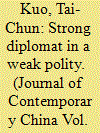

|
|
|
|
|
| Publication |
2009.
|
| Summary/Abstract |
Renowned as one of China's most eloquent and persuasive spokesmen in the United States during WWII, T. V. Soong, who served as Generalissimo Chiang Kai-shek's personal representative in Washington, had obtained vital US aid for China when it appeared that Chinese military will was about to collapse. He had negotiated strategic loans with the US and produced critical economic and military aid packages, thus projecting a strong national image of China to the Western Allies. But historians, until now, have known almost nothing about Soong's wartime, diplomatic endeavors, especially his managing of Sino-American relations. Archival materials at the Hoover Institution have only been recently opened, allowing this author to describe some unique episodes in US-China relations during the years 1940 to 1943.
|
|
|
|
|
|
|
|
|
|
|
|
|
|
|
|
| 9 |
ID:
086301


|
|
|
|
|
| Publication |
2009.
|
| Summary/Abstract |
Primarily relying on the Kuomintang Party archives recently available to scholarship at the Hoover Institution Archives, this article examines the roles of the Kuomintang Central Reform Committee and the party reform under it between 1950 and 1952. The Committee became a crucial contributing factor in terms of the survival of the once defeated and demoralized Kuomintang as a ruling party. While the Kuomintang under the Committee created a variety of direct or indirect controls over the government and society that gave it unquestioned dominance, it also began to interact closely with the people on Taiwan as a result of the party recruitment and the implementation of local-level political reforms, two salient agendas that had never taken place in the mainland. For the sake of revitalizing a party capable of responding to challenges in a new environment, the Kuomintang during its reform period promulgated new rules and regulations, set up new agendas and implement new policies, and instituted various party local branches in different social stratum and vocational categories. These measures, in turn, helped Kuomintang undergo an institutional and cognitional change that was totally unimaginable in the past.
|
|
|
|
|
|
|
|
|
|
|
|
|
|
|
|
| 10 |
ID:
086305
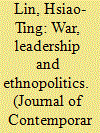

|
|
|
|
|
| Publication |
2009.
|
| Summary/Abstract |
This article examines how China's war with Japan served as a crucial factor that shaped modern China's ethnopolitics. It argues that the Japanese invasion of China in 1941-1945 provided the Nationalists with an unprecedented opportunity to push their authority further westward into the Central Asian heartlands. The Nationalists' marching westward as a result of the Japanese invasion also urged them to factor frontier and ethnopolitics into their wartime strategic thinking and institutional reforms. To a great extent, the war and its repercussions caused a redefinition of modern China's border security and defense in both northwestern and southwestern China. The war with Japan turned the Nationalists westward, a new perspective which shifted the power relationship between the Nationalists and China's frontier regional leaders. This historical phenomenon resulted in the extension of Nationalist power to, and the building of, new institutions and infrastructures, in China's remotest ethnic frontier. It also contributed to modern China's first contact with the Middle East. The westward expansion during wartime also transformed modern China from a maritime economy rooted in East Asian trade to a continental one based on overland trade routes through the heartland of Asia.
|
|
|
|
|
|
|
|
|
|
|
|
|
|
|
|
| 11 |
ID:
086322
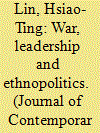

|
|
|
|
|
| Publication |
2009.
|
| Summary/Abstract |
This article examines how China's war with Japan served as a crucial factor that shaped modern China's ethnopolitics. It argues that the Japanese invasion of China in 1941-1945 provided the Nationalists with an unprecedented opportunity to push their authority further westward into the Central Asian heartlands. The Nationalists' marching westward as a result of the Japanese invasion also urged them to factor frontier and ethnopolitics into their wartime strategic thinking and institutional reforms. To a great extent, the war and its repercussions caused a redefinition of modern China's border security and defense in both northwestern and southwestern China. The war with Japan turned the Nationalists westward, a new perspective which shifted the power relationship between the Nationalists and China's frontier regional leaders. This historical phenomenon resulted in the extension of Nationalist power to, and the building of, new institutions and infrastructures, in China's remotest ethnic frontier. It also contributed to modern China's first contact with the Middle East. The westward expansion during wartime also transformed modern China from a maritime economy rooted in East Asian trade to a continental one based on overland trade routes through the heartland of Asia.
|
|
|
|
|
|
|
|
|
|
|
|
|
|
|
|
|
|
|
|
|